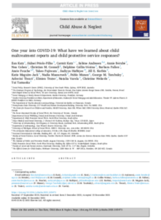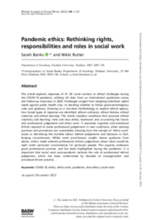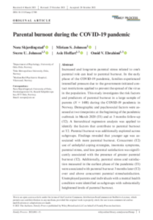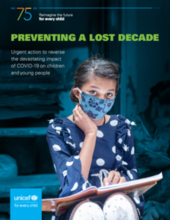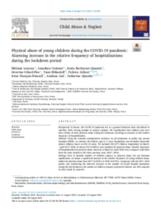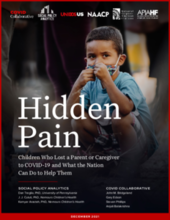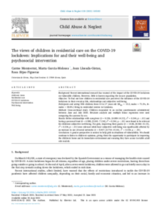This section includes resources on the response to the COVID-19 pandemic as it relates to child protection and children's care.
News on COVID-19 and Children's Care
Webinars and Events on COVID-19 Response
Displaying 61 - 70 of 756
This study is part of a larger initiative using an international platform to examine child maltreatment (CM) reports and child protective service (CPS) responses in various countries. The first data collection, which included a comparison between eight countries after the pandemic's first wave (March–June 2020), illustrated a worrisome picture regarding children's wellbeing. The current study presents the second wave of data across 12 regions via population data (Australia [New South Wales], Brazil, United States [California, Pennsylvania], Colombia, England, Germany, Israel, Japan, Canada [Ontario, Quebec], South Africa).
This article explores responses of 41 UK social workers to ethical challenges during the COVID-19 pandemic, utilising UK data from an international qualitative survey and follow-up interviews in 2020. Challenges ranged from weighing individual rights/ needs against public health risks, to deciding whether to follow government/agency rules and guidance.
This report is a follow up to the ‘What Makes Life Good?’ report published in 2020 about the views of care leavers on their well-being, using pre-pandemic data collected between 2017 and 2019 through the Your Life Beyond Care survey. In this follow-up report, the authors compare the ‘What Makes Life Good?’ pre-pandemic data from 1,804 care leavers to data from 2,476 care leavers in 2020 to 2021, since the start of the COVID-19 pandemic. This has allowed them to identify priority areas that have emerged recently. Care leavers aged 16 to 25 were asked the same questions at both time points; about their living arrangements and safety, financial well-being, relationship with care workers, emotional support, stress, loneliness, overall well-being, and more.
Increased and long-term parental stress related to one's parental role can lead to parental burnout. In the early phase of the COVID-19 pandemic, families experienced intensified pressure due to the government-initiated contact restrictions applied to prevent the spread of the virus in the population. This study investigates the risk factors and predictors of parental burnout in a large sample of parents during the COVID-19 pandemic in Norway.
Understanding the risks and responses to children’s caregiving environment during COVID-19 remains limited. This is especially the case in humanitarian settings. This brief, therefore, aims to report what is known so far during the pandemic. The brief focuses on strategies to strengthen the caregiving environment through family- and community-based approaches. It also offers a series of case studies from various humanitarian and emergency contexts.
As UNICEF commemorates its 75th year, this report lays out the work in front of us by taking stock of the ongoing impact of COVID-19 on children and the road to respond and recover to reimagine the future for every child.
In France, the COVID-19 pandemic led to a general lockdown from mid-March to mid-May 2020, forcing families to remain confined. This study found a significant increase in the relative frequency of young children hospitalized for physical abuse from 2017 (0.053%) to 2020 (0.073%).
Among the more than 760,000 deaths from COVID-19 in the United States are parents, custodial grandparents, or other caregivers on whom children had relied for financial, emotional, and developmental support. Many of these children already faced significant social and economic adversity, and these devastating losses can impact their development and success for the rest of their lives. This report estimates the number of children who lost a parent or other caregiver to COVID-19 and provides concrete recommendations for urgent actions to protect these vulnerable children and their remaining caregivers.
Recent international research has warned of the impact of the COVID-19 lockdown on vulnerable children. However, little is known regarding the in-care population. The objective of this study was to find out how children in residential care perceived the influence of the COVID-19 lockdown in their everyday life, relationships and subjective well-being. Participants and setting: 856 children from 10 to 17 years old (Mage = 15.5, males = 71.2%, females = 28.8%) living in residential centres in Catalonia.

